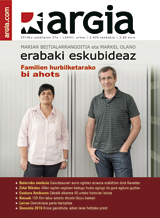The “fame” of food changes (I)

The nutritional findings allow us to better understand the negative and positive aspects of some foods. But when those discoveries question or even completely overturn the “round truths” that have been the basis of our food over the centuries, anyone comes up with curious questions: Is the pig very fatty? Is it inevitable that we turn away from our daily regime? Is it advisable to eat a lot or little blue fish? Is the egg good or bad for health? Because what we always thought was bad is not so harmful, and the one who believed it to be good has a lot to improve...
However, although the reputation of food before our eyes has been changing a lot according to the years and fashions of the time, it is not advisable to classify foods as “healthy” and “harmful”, as the diet should be valued in its entirety: the quality, variety and proportion of the foods we eat and drink are the main aspects to consider.
Man has always given importance to food and drink, but beliefs, opinions and ratings about food have hardly been scientifically based throughout history. Nutrition is a very young science, as in the 19th century they began to use concepts such as “calories”, “food”, etc. Until then, they were based on the observation and experience of the experts. The aphorisms of Hippocrates testify to this: “Let food be your food and food be your medicine.”
Throughout history, different criteria have been used to classify foods. Thus, they were distinguished between “pure” and “non-pure”, or between “strong”, “intermediate” and “weak”, “ingredients” and “poisons”, and even those that could be used as “drugs”.
Egg
This food, observed with bad eyes among people with high cholesterol content, has a great nutritional value and contains proteins of high biological value, lecithin, minerals and vitamins. Lecithin, precisely, helps maintain blood cholesterol in the suspension, preventing it from building up on the walls of the arteries. However, there are still many who believe that egg is solely responsible for the high levels of cholesterol in their blood, rather than focusing on all foods rich in animal fats, such as sausages or cheeses, and starting an active life. In short, every day you can take an egg without worries.
Blue fish
For a long time, blue fish has been considered much more harmful than white fish, simply because it has a lot of fat. However, at the end of the 20th century it was shown that blue fish was not bad, but very beneficial because it was seen that their polyunsaturated fats, like omega-3, lowered bad cholesterol and increased good cholesterol. However, at present, and it has not been 25 years since the last change, blue fish favors are being questioned for two reasons: on the one hand, a comprehensive study on omega-3 additives has shown that these additives do not reduce the mortality rate – whatever the cause of their death – and on the other hand, experts have begun to rethink the recommended weekly rations in view of the large amounts of methylmercury found in some species of our species.
In recent years numerous articles have appeared on the benefits of chocolate. Black chocolate, composed of more than 70% cocoa, contains potassium, magnesium, calcium, vitamin B3, epicatechin and antioxidants, among other ingredients.
Antioxidants, in addition to acting against... [+]
Elikadura hiztegiak bi osagai ditu, batetik, glosario hutsa eta bestetik hiztegi entziklopedikoa. Biak sarean daude erabiltzeko moduan.
McDonald’s-ekin loturiko informazio bat bolo-bolo zabaldu zen sare sozialetan, duela pare bat hilabete. Konpainiak errezeta aldatu behar izan omen zuen, Jamie Oliver sukaldari britainiarrak frogatu ostean McDonald’seko jatetxeetan saltzen den haragia jangaitza... [+]














